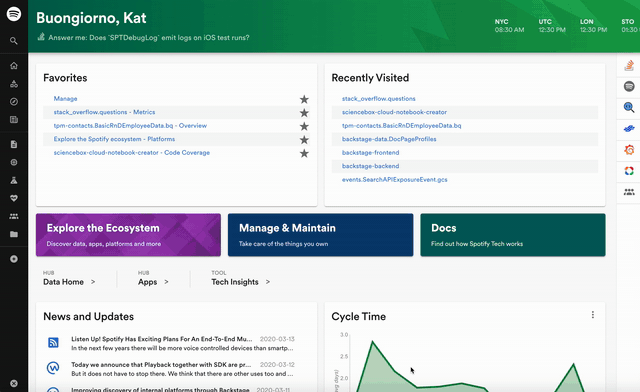Spotify's open source side-hustle
Doubling down on dev tools biz
In issue #16 of Forkable, I look at Spotify’s continued foray into commercial open source software. The music-streaming giant has been selling premium tools and services off the back of a project it open sourced five years ago.
Elsewhere, COSS Corner this week profiled a young open source startup called Dosu, which is setting out to automate the toil of code maintenance and support for open source projects.
And in Patch Notes, I summarize all the key happenings in the world of open source.
As usual, feel free to reach out to me with any questions, tips, or suggestions: forkable[at]pm.me.
Paul
Open issue
Spotify’s side-hustle soars
When Spotify open sourced Backstage back in 2020, there was nothing particularly unusual about the move — big tech companies open source their internal technologies all the time, particularly those aligned with the developer community.
Fast-forward two years, however, and a big WTF moment emerged when Spotify decided it was really going to double-down on Backstage by selling tools and services off the back of it.
A music-streaming company creating a side-hustle as a dev tools business? For real?
Backstage, for the uninitiated, helps companies build customized “internal developer portals” (IDPs), bringing order to their infrastructure chaos by combining all their tooling, apps, data, services, APIs, and documents in one place.
Backstage has been adopted by more than 2 million developers across thousands of companies such as Airbnb, LinkedIn, and American Airlines. Moreover, the Cloud Native Computing Foundation (CNCF), which accepted Backstage as an incubating project in 2022, recently reported that it was one of its top five projects last year.
While the core open source Backstage product is freely available for anyone to use, including a swathe of open source plugins that extend its feature set, Spotify has been selling premium plugins since 2022. And starting last year, Spotify started rolling out what would become a fully-hosted SaaS incarnation — “Backstage in a box,” as the company calls it.
I’ve been fascinated by this business play ever since I heard about it three years ago. So I caught up with Tyson Singer, Spotify’s head of technology and platforms, at KubeCon last month, to discuss all-things Backstage — in what would prove to be my final story for TechCrunch.
In the interview, we discuss the genesis for Backstage and why Spotify decided to open source it in the first place. The long-and-short is that Spotify had been blindsided on an unrelated container orchestration project several years previous, whereby it had to ditch its own home-grown product for Kubernetes which Google had open sourced and eventually won-out the market. Spotify had to make the “painful” decision to transition to Kubernetes.
“When you have a product that gets replaced by an external product, particularly an open source one, that migration cost is just tremendous,” Singer explained. “And so we decided that we don’t want that to happen to a product that is literally the foundation of how we do development at Spotify.”
And that is why Spotify is going all-in on Backstage as a business — it’s to ensure that it sticks, and becomes the industry standard IDP platform.
Elsewhere, Spotify recently debuted a couple of new premium plugins for Backstage, including AiKA (“AI knowledge assistant”), a chatbot developed internally for its own employees and which Spotify will now offer to Backstage customers as a paid add-on.
You can read the full interview here: Backstage access: Spotify’s dev tools side-hustle is growing legs
COSS Corner
Dosu automates the toil of code maintenance and support for open source projects
In this week’s COSS Corner, I chatted with Devin Stein, founder of Dosu, a two-year-old startup that’s building an AI-powered software development sidekick — but rather than focusing on code completion or reviews like you get with the likes of GitHub Copilot, Dosu connects to your documents and GitHub repository for the express purpose of maintaining code. This includes automating issue triaging, creating and updating documentation, and answering questions — all the stuff that happens outside the IDE.
Dosu itself isn’t open source (yet), but its core focus — and its entry point to the business world — lies squarely on open source project maintainers.
“Where Dosu is useful is when you have a knowledge gap or knowledge imbalance: you have a few experts, and many users — or fewer non-experts — working on a project,” Stein told me.
Prior to Dosu, Stein worked in various software development and engineering roles, including stints at DocuSign and, most recently, a VC-backed AI startup called Viaduct. In tandem, Stein has also been active in the open source realm as maintainer on projects such as Sparkmagic and KSOPS.
And it was a culmination of this work in the corporate and open source spheres that led Stein to found Dosu in 2023.
“As an open source maintainer, I basically found myself in the exact same position [as his day job], where much of my time was spent on support and helping share the context I had about the project,” he said.
Read more: Dosu automates the toil of code maintenance and support for open source projects
Patch notes
FastAPI forms company, finds funding
Last year, I wrote about some of the equity-free funding initiatives targeted at open source projects. One of them stemmed from Silicon Valley VC Sequoia Capital, which had launched a fellowship to support open source project maintainers. Its first fellow was Colombian software developer Sebastián Ramírez Montaño, creator of FastAPI, an open source web framework for building APIs. It’s super popular, with more than 84,000 stars on GitHub.
It was perhaps inevitable, but Montaño has now launched a commercial entity called FastAPI Labs which is in the midst of building a cloud service on top of FastAPI. To support this effort, FastAPI Labs announced this week that it raised $4.2 million in a seed round of funding led by — you guessed it — Sequoia. A slew of angel investors joined the round, hailing from companies including DeepMind, Sentry, Hugging Face, MongoDB, and more.
A notable aside: Sequoia has also backed another company called Pydantic, developer of a popular Python library and open source data-validation framework which FastAPI uses under the hood.
It’s a small world…
A quartet of acquisitions
Acquisitions in the open source realm are a bit like waiting for a bus — nothing comes for ages, then four come along at once.
Elastic — creator of enterprise search and data retrieval engine Elasticsearch — is no stranger to open source. Having re-adopted an open source license for its core product last year, the company this week announced it was buying Keep, an open source AIOps platform that helps companies manage and automate alerts across their various systems — it’s all about de-duplicating, prioritizing, and reducing alert fatigue.
Meanwhile, BrowserStack — the $4 billion-valued app-testing platform — acquired Requestly, an open source API mocking and testing tool for developers and QA teams.
Elsewhere, Plane — a fledgling startup taking on Jira with an open source project management tool for software teams — acquired Sort, a platform that brings in structured workflows for data changes. Kind of like a “GitHub for data.”
Finally, a scoop from Alex Konrad at Upstarts: Databricks is apparently mulling a $1 billion bid for Neon, creator of an open source, serverless PostgreSQL database platform — an alternative to AWS Aurora Postgres.
Open source auth infra
Tesseral launched this week with $3.3 million in funding to serve as the open source authentication infrastructure for B2B SaaS apps.
More on Hackernoon.
Ghost goes gangbusters
Open source publishing platform Ghost announced a couple of milestones this week: Founder and CEO John O’Nolan said that the company now has an $8 million annual run rate, and it’s just about to pass $100 million in revenue earned by publishers on Ghost.
And finally… an open source humanoid for $5k?
Commercial humanoids can cost a (robotic) arm and a leg, but Berkeley this week debuted an open source humanoid built with desktop 3D printers, which anyone can apperently build themselves for around $5,000.
Read the academic paper with all the pertinent details here.



